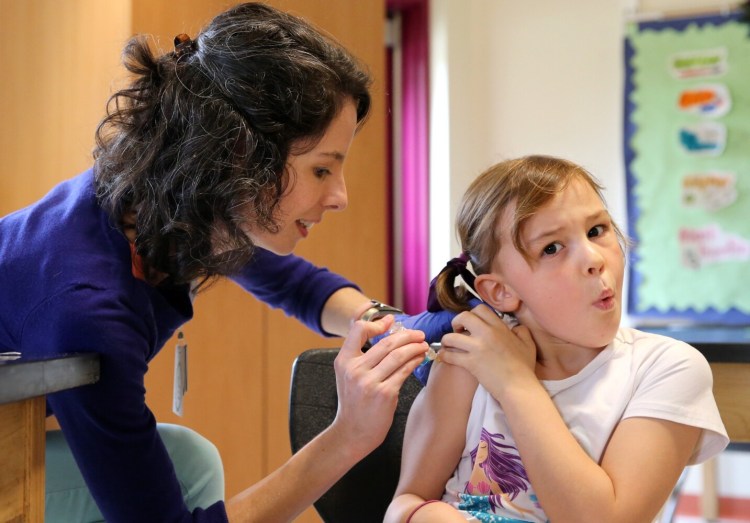The 2019-20 flu season could be severe, health experts say, while also cautioning that it’s difficult to predict how the flu season will develop.

The U.S. CDC does not begin issuing forecasts of the flu season until late fall – to give scientists time to gather information – but top public health experts across the country say there are some troubling signs.
The flu season runs from October to May, with the most severe months typically from December through March.
The Maine Center for Disease Control and Prevention reported the first confirmed flu illnesses this week – although there are no official numbers yet. In the 2018-19 flu season, Maine had 10,418 confirmed cases of the flu and 48 flu-related deaths, compared to 9,050 cases and 82 deaths in 2017-18.
Far more people fall ill from the flu than officially confirmed cases, as many recover at home and do not seek medical attention. There is no cure for influenza.
Dr. Nirav Shah, director of the Maine CDC, said the severity of the flu season in Australia is an “early indicator” that it could be a bad one in the United States. The virus typically travels from south to north, and how the flu circulated in Australia is one factor scientists use to make flu forecasts. Also, a pediatric death in California in September – which is early for the first death – also could indicate that a more virulent strain of flu is circulating, Shah said.
“The flu is not to be trifled with. The flu is an exceptionally serious illness,” he said. “The flu shot is one of the best things you and your family can do for your family’s health.”
Nationwide, an estimated 37 million to 43 million Americans were sickened by the flu in 2018-19, including official cases and estimates of those who were sick but not tested, the U.S. CDC said. The flu caused more than 500,000 hospitalizations and about 34,000 to 61,000 deaths last season.
About 45 percent of Americans get an annual flu shot, a number that public health officials want to increase.
Because scientists must attempt to predict what strains of the virus will be most predominant months in advance – in order to get the flu shot to market in time – the effectiveness of the shot varies by year and never provides 100 percent protection. The flu shot was 47 percent effective for 2018-19, according to the U.S. CDC, and in recent years has typically between 40 to 60 percent effective.
However, research has proven that even though the flu shot cannot always protect people from the flu, those who do get immunized and still contract the virus typically have milder symptoms than those who fall ill and did not get immunized.
Flu symptoms include fever, chills and sweats, aching muscles, headache, dry cough and fatigue.
Maine has recently boosted its public health nursing workforce, Shah said, and those nurses help run immunization clinics across the state. Many workplaces, schools and community centers host flu clinics, and people often can get a flu shot at pharmacies, grocery stores and their primary care doctor’s office.
The Maine CDC also is conducting a public education campaign to remind women who are pregnant to get their flu shot, Shah said. The shot will not only protect the mother, but also provides protection to the baby after birth.
Greater Portland Health is hosting about a dozen free flu clinics this season, said Ann Tucker, chief executive officer of the public health nonprofit.
Everyone – even the uninsured – can get a free flu shot at Greater Portland Health, which has nine locations in Portland and South Portland, Tucker said.
Every year, Greater Portland Health increases the number of its flu clinics, as well as encouraging its patients to get the shot when they come in during flu season, Tucker said. The nonprofit gave 3,200 shots in 2018-19, and already has given more than 700 this fall.
“We look to improve access as much as we can,” Tucker said.
The next two Greater Portland Health flu clinics are 10 a.m. to 2 p.m. Monday at Riverton Park, 59 Riverton Drive in Portland; and 2-5 p.m. Wednesday at Franklin Towers, 211 Cumberland Ave., Portland. For more information, call 207-874-2141.
Send questions/comments to the editors.



